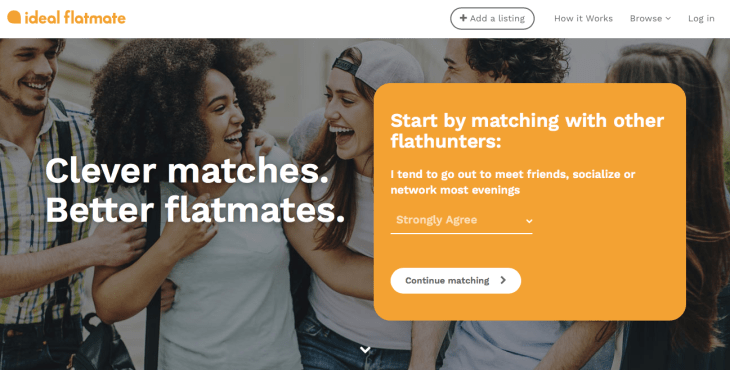Londoners in the unfun position of needing to find a new flatmate — and lacking the easy options of friends or family to move in with — can get a little algorithmic help from a UK startup with the no-frills name of Ideal Flatmate.
The startup is applying dating-style personality matchmaking to try to make it easier for strangers to locate a compatible house companion. Users are asked to take an on-site survey, responding to a series of statements with a scaled response (from strongly agree to strongly disagree), in order to be matched with potentially compatible flatmates.
There are already a few US startups offering algorithmic roommate matching platforms, such as college student-focused platform roomsurf, but Ideal Flatmate is claiming to be the first to market in the UK. It’s also not limited to students, though it is limited to London flatshares for now — though the plan is to expand nationwide in the UK this year.
It soft launched its website last October but is officially launching now — with some 3,000 registered users at this nascent stage, 1,000 listed properties, and a total of around 30,000 unique visitors so far.
Development has been funded by the founders and a couple of unnamed private investors. “We’re looking to run a further round of funding later in the year,” says co-founder Tom Gatzen.
“Given that more than half of the 20-39 age group is projected to be renting privately by 2025, the market is growing significantly,” he adds.
It’s certainly true that over the past decade a growing proportion of UK households have been renting vs owning their own homes — socioeconomic shift that’s sometimes badged with the label: ‘Generation Rent’ — a trend driven by various factors such as steeply rising house prices as demand for housing has outstripped supply.
“There have been a mix of flathunters using the site and landlords uploading their properties,” says Gatzen, discussing who the typical user is thus far. “The highest proportion of users are in the 20-35 bracket but there are also a significant number of 40+ flathunters, indicative of the growing number of this age range living in shared rental accommodation as a result of societal changes.”
The site’s matchmaking survey covers areas that can be typical flashpoints for domestic harmony, such as socializing habits and attitudes to cleanliness. But it’s also probing a little deeper on the personality front, with questions that look to identify how extroverted or introverted a person is — and match users accordingly. It has worked with two psychologists from the University of Cambridge to help develop the survey.
“We ran market research on over 500 flatsharers asking them 100 questions which we felt were the most relevant in working out whether you are compatible flatmates. After running a factor analysis with our Cambridge professors and testing the answers we received, the 20 questions we have were found to be the most important.”
It’s clearly too early for the team to be able to stand up their matchmaking approach with any firm data proving effectiveness, but Gatzen claims anecdotal feedback so far looks positive with users saying they “feel” they’re getting matched to “like-minded people”.
“A key part of our progression will be around fine-tuning and testing the matching to ensure people are getting paired up with suitable flatmates,” he adds.
Despite it being early days, the team is not taking its time to start booking revenue, launching paid options in recent weeks — but then flathunting is typically a problem with a very limited lifespan. People might be content to go on dates for years and years, but most sane people don’t want to be stuck in ‘living limbo’ for more than a month or two at most.
Add to that most London flatshares have a 12 month contract attached to them, so the revenue opportunities here are widely spaced too. Even factoring in ‘Generation Rent’ this is not a dating-sized market opportunity, by any means.
So while it’s free to browse Ideal Flatmate the ability to contact potential flatmates requires users to stump up for a subscription. Pricing starts at £4.99 for a week’s access — for which they get delivered matches with the “most compatible potential flatmates and properties” for their criteria (so location, budget and personality).
They also get access to the on-site messaging feature so matched users/groups of users can start to chat to see whether they want to meet in person to talk about a possible flatshare.
A second strand of the monetizing strategy will also launch soon, with Gatzen saying they will start charging landlords and letting agents a fee to advertise on the site this spring.
The startup’s balancing act looks as if it will be not discouraging the quantity of users it needs to be able to deliver enough relevant/quality matches for its target flatseekers and landlords to consider it a service worth paying for — risking limiting its potential to grow large enough to generate enough revenues to be sustainable beyond the short term.
